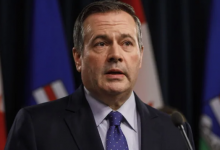Alberta planning to create provincial parole board
Alberta will have its own parole board to hear applications from provincial inmates, should new legislation become law.
The United Conservative Party government introduced a bill Monday that Premier Jason Kenney said will create an Alberta parole board by January 2021.
Running parallel to the federal board, board members could only hear applications for release from inmates in provincial correctional centres sentenced to less than two years in jail.
The move would fulfil a UCP campaign promise — one of several commitments to tackle what they say is a spike in rural crime.
“Too often, that’s because of a revolving-door justice system where criminals are arrested, convicted and are back out on the street re-victimizing more Albertans and causing frustration for our police and law-abiding citizens,” Kenney said at a Monday press conference.
The parallel provincial system will be fairer, faster and more efficient, Kenney said. The government will appoint provincial parole board members who come from rural communities experiencing rising crime, he said.
“The federal parole boards filled with Ottawa’s appointees aren’t as sensitive or as responsive to the needs and concerns of Alberta communities as they could be or should be,” Kenney said. “And when they make mistakes, and set loose dangerous criminals who commit further crimes, it’s Albertans who pay the price.”
Both Ontario and Quebec have independent provincial parole boards.
Transparency lacking, Kenney says
Kenney said 212 provincial inmates applied for parole in Alberta in 2018-19. The parole board approved 50 applications from offenders. Three were revoked for reasons the board hasn’t released, he said.
Kenney criticized the transparency of the federal parole system and said Alberta will release more information about provincial parole decisions.
In 2018-19, 6,009 people were sentenced to serve time in an Alberta provincial correctional centre, according to the justice ministry.
Justice Minister Doug Schweitzer said the board would cost about $600,000 a year to run, a portion of which would be covered by the federal government.
When asked what the additional cost to the correctional system would be for potentially housing more inmates for longer, Schweitzer said he didn’t want to “presuppose what the decisions will be from the Alberta parole board.”
Kathleen Ganley, the Opposition justice critic, questioned Monday whether Alberta has enough potential provincial parolees to justify the expense of a duplicate system.
Investing more money into rural policing and programs that help re-integrate offenders would be more successful at battling crime, she said.
“It’s like almost everything else they’ve done on rural crime. They want to appear to be doing something about the problem without actually having to do something about the problem.”
In 2019-20, the Alberta justice ministry spent nearly $1.5 billion, the bulk of which paid for public security, corrections and court costs.
Ministry spokesman Dan Laville said in an email it’s too soon to know how a provincial parole board’s decisions could affect corrections costs. Housing inmates is costly, but so are the booking and releasing processes, he said.
“It is the government’s duty to ensure Albertans are not further victimized by those who should still be behind bars and we view one repeat offender as one too many,” Laville said.
The government has yet to determine the number or makeup of provincial parole board members, he said. They will come from different regions of Alberta and serve a maximum term of five years.
Eighteen of 60 members of the federal parole board are from the “Prairie” region, which includes part of Ontario and the Northwest Territories. The number of Alberta board members was unavailable on Monday.
Government moves to appoint provincial chief firearms officer
Also on Monday, Kenney said the Alberta government would push ahead with appointing a provincial chief firearms officer.
It’s a move sparked by the UCP government’s displeasure with the federal Liberal government’s proposed legislation to ban 1,500 makes and models of assault-style firearms in Canada.
The proposed ban came weeks after a Nova Scotia man used illegal weapons from the U.S. to kill 22 people — Canada’s deadliest mass killing to date.
“By appointing an Alberta chief firearms officer we believe we can have somebody, while obviously committed to upholding the law, will do so in a way that focuses enforcement on criminal misuse of firearms rather than regulatory harassment of safe, legal law-abiding farmers in God’s country,” Kenney said.
He said the federal government could more effectively prevent gun crime by tackling the illegal importation of firearms into Canada from the U.S.
A motion before the Alberta legislature proposes the Alberta government “take all necessary steps to assert provincial jurisdiction” in connection with gun control, including the appointment of a provincial firearms officer to supercede a federal officer. Kenney said MLAs are likely to debate the motion this week.
Appointing a provincial firearms officer was one of a list of increased provincial powers Kenney’s “fair deal” panel was tasked with exploring last winter and spring. It recently submitted a report that has yet to be released.
Earlier on Monday, Kenney said on a Calgary radio show the Alberta government would also consider supporting a private citizen’s legal challenge of potential new federal gun restrictions, should one arise.
Although Kenney acknowledged the federal government has jurisdiction over the regulation of firearms, he said he’s read legal opinions suggesting the bill is an overreach.
CBC








Redes Sociais - Comentários